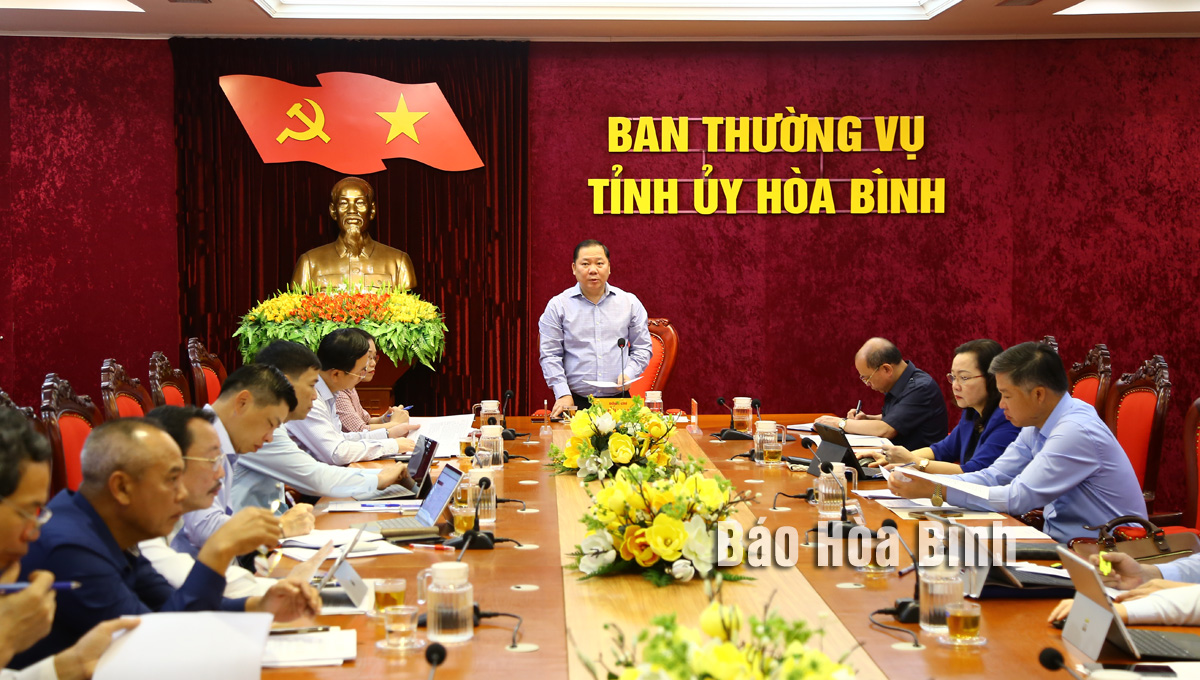
Nguyen Phi Long, an alternate member of the Party Central Committee, Secretary of the Hoa Binh provincial Party Committee, and head of the steering committee for the province's key projects, chaired a conference on March 25 to discuss measures for implementing the project on constructing the Hoa Lac - Hoa Binh road and upgrading the Xuan Mai - Hoa Binh section of National Highway 6 under the public-private partnership (PPP) model.
Participants included Bui Thi Minh, Permanent
Deputy Secretary of the provincial Party Committee, Chairwoman of the
provincial People's Counciland deputy head of the provincial Party
Committee's Organisation Board; Bui Duc Hinh, Deputy Secretary of the
provincial Party Committee and Chairman of the provincial People's Committee;
leaders of relevant departments and agencies; and Infinity Group joint Stock
Company.
Nguyen
Phi Long, an alternate member of the Party Central Committee, Secretary of the
Hoa Binh provincial Party Committee and head of the steering committee for the
province's key projects, speaks at the conference.
According to a report from the Standing Board of
the Party Committee at the provincial People's Committee, on March 20, 2025,
Deputy Prime Minister Tran Hong Ha signed Decision No. 653/QD-TTg approving the
adjustment of the investment policy for the project to construct the Hoa Lac -
Hoa Binh road and upgrade the Xuan Mai - Hoa Binh section of National Highway 6
under the PPP model.
Specifically, the Hoa Lac - Hoa Binh road will
be expanded to meet highway standards with six lanes and a designed speed of
100 km/h. Under the project from 2014 to 2028, the road that is now in use had
its construction started in 2014 and was opened to traffic in 2018. The road
expansion is carried out from 2023 to 2028. The work requires about 253.82 ha,
including about 63.5 ha in Hanoi and 190.34 ha in Hoa Binh province. The
preliminary adjusted investment totals nearly 10.5 trillion VND.
At the conference, participants evaluated
results while pointing out difficulties and obstacles during the project
implementation, especially those relating to site clearance, resettlement, the
environmental impact assessment report, procedures for changing forest use
purpose, and land allocation and leasing procedures.
Concluding the event, Long emphasised that the
investment project to expand the Hoa Lac - Hoa Binh road plays a crucial role
in opening up opportunities for the province's development as it will gradually
complete the highway network under the road network master plan for the
2021-2030 period, with a vision to 2050. It will also help connect the capital
city's highways with the provinces of Hoa Binh, Son La, and Dien Bien; create a
basis to attract investors in various fields, especially urban, industrial,
trade, and service development; and drive socio-economic development in Hoa
Binh and northwestern provinces in general.
The province aims to commence the project on
July 1, 2025, he said, urging sectors, localities and investors to closely
coordinate to ensure the project's progress.
He asked the provincial People's Committee to
establish a working group led by a Vice Chairman of the provincial People's
Committee to directly oversee resolving the difficulties and obstacles of the
project.
He tasked relevant sectors to allocate resources
for site clearance. Hoa Binh city was told to focus on directing site clearance
and resettlement while organizing communication activities to win public
support for project implementation. The investor was requested to coordinate
closely with relevant agencies to promptly complete the necessary procedures to
commence the project.
The Standing Board of the Hoa Binh provincial Party Committee has agreed in principle on a proposal by the Standing Board of the Party Committee of Hoa Binh city to gather feedback on the city’s 1:2000 zoning plan, which forms part of its broader urban development strategy.
Hoa Binh province has made notable progress in public administration reform and digital government development, with the satisfaction index among citizens and businesses reaching over 84%, according to recent government evaluations.
Thanks to great efforts by local authorities in recent times, the governance and public administration performance of Mai Chau district has been significantly improved.
In the afternoon of June 6, the Party Committee, the People's Council, the People's Committee and the Fatherland Front of Lac Son district solemnly held a meeting to celebrate the 139th anniversary of the district's founding (1886–2025) and the 79th anniversary of the establishment of the district's Party Committee (1946–2025). There was the attendance of Mr. Bui Van Thang, the Vice Chairman of the Provincial People's Council; Mr. Quach Tat Liem, the Vice Chairman of the Provincial People's Committee; Ms. Dang Bich Ngoc, the Deputy Head of the National Assembly Delegation of the province; as well as the former leaders of the province and district through various periods, who are the natives of the district.
Implementing the Politburo’s Resolution No. 57-NQ/TW on breakthroughs in science – technology, innovation, and digital transformation is a golden opportunity for the northern mountainous province of Hoa Binh to renew growth model, improve competitive edge and shorten digital gap.
Resolution 57-NQ/TW, issued by the Politburo on December 22, 2024, identifies sci-tech, innovation, and digital transformation as strategic breakthroughs to build a developed and prosperous nation. In Hoa Binh province, this spirit is not just a slogan, it’s being put into action through concrete initiatives that form a "new development triangle”: digital citizenship, digital economy, and digital administration.



